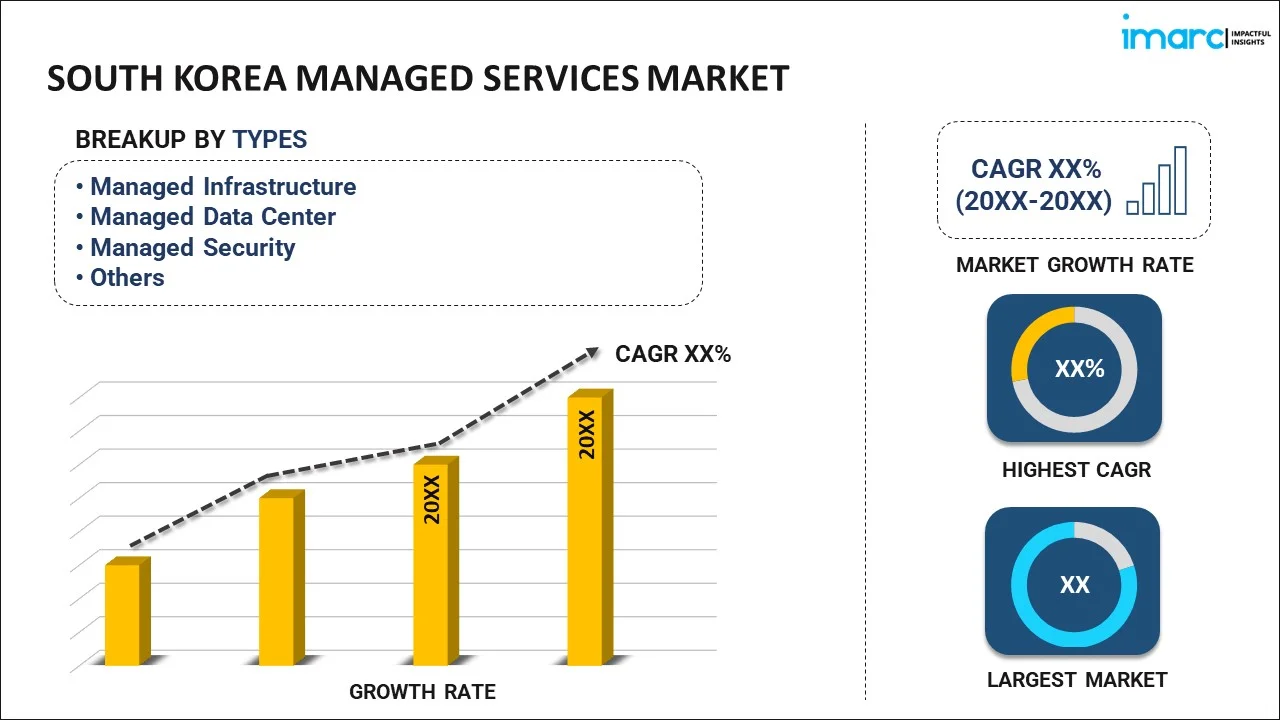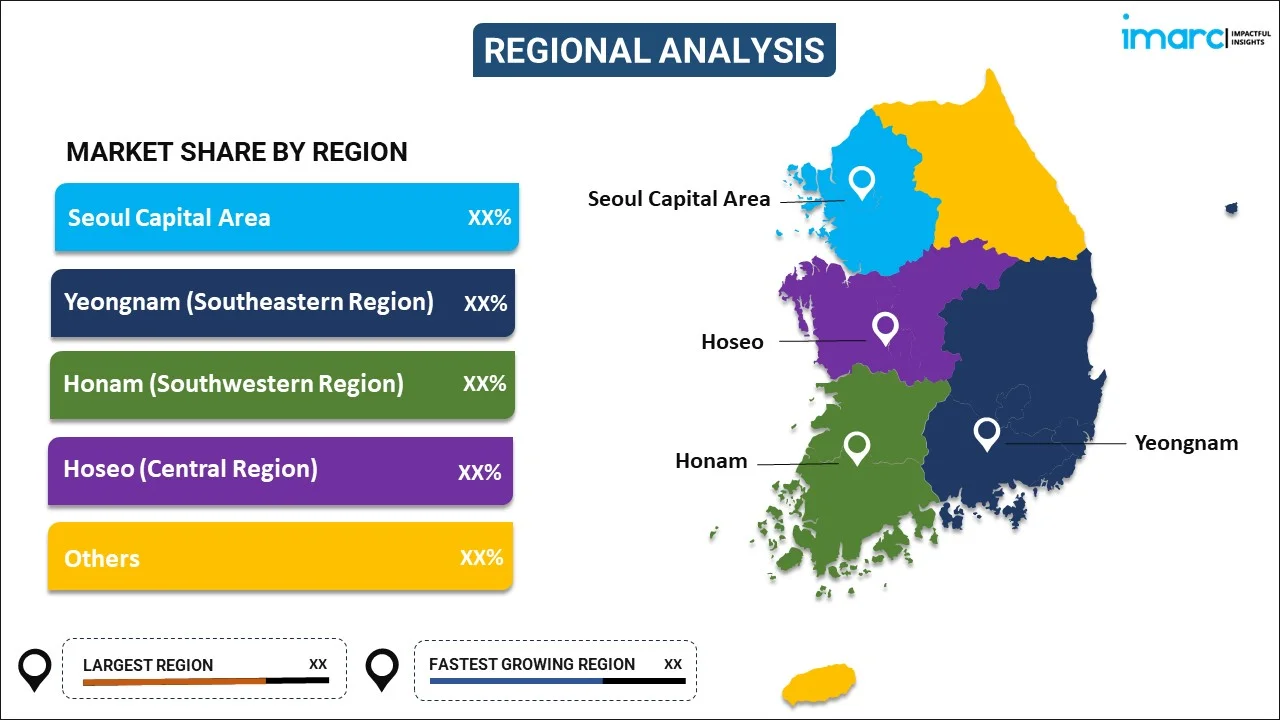
South Korea Managed Services Market Report by Type (Managed Infrastructure, Managed Data Center, Managed Security, Managed Communications, Managed Network, Managed Mobility), Deployment Mode (On-premises, Cloud-based), Enterprise Size (Large Enterprises, Small and Medium-sized Enterprises), End Use (IT and Telecommunication, BFSI, Healthcare, Entertainment and Media, Retail, Manufacturing, Government, and Others), and Region 2025-2033
Market Overview:
South Korea managed services market size reached USD 5,805.2 Million in 2024. Looking forward, IMARC Group expects the market to reach USD 7,296.3 Million by 2033, exhibiting a growth rate (CAGR) of 2.57% during 2025-2033. The increasing complexity of IT infrastructures, the rising concern around cybersecurity in the digital age, and the introduction of government initiatives to promote technological advancements, and considerable growth in the small and medium enterprise (SME) sector represent some of the key factors driving the market.
|
Report Attribute
|
Key Statistics
|
|---|---|
|
Base Year
|
2024
|
|
Forecast Years
|
2025-2033
|
|
Historical Years
|
2019-2024
|
| Market Size in 2024 | USD 5,805.2 Million |
| Market Forecast in 2033 | USD 7,296.3 Million |
| Market Growth Rate 2025-2033 | 2.57% |
Managed services refer to the practice of outsourcing specific business processes and functions to a third-party provider aimed at enhancing operations and cutting expenses. This model covers a broad range of services, including IT support, network management, cybersecurity, cloud services, and data analytics, tailored to meet diverse business needs. They are characterized by proactive management and regular maintenance rather than reactive, on-demand support. This approach ensures continuous monitoring and timely updates, which are crucial in today's fast-paced business environment. Key advantages of managed services include cost efficiency, as they eliminate the need for in-house teams to manage complex IT infrastructures. Additionally, they offer a strategic method for improving operational efficiency, streamlining IT processes, scalability, allowing businesses to adjust services based on their evolving requirements and focus on their core competencies. They also offer. Enhanced expertise is another significant benefit, as managed service providers (MSPs) bring specialized knowledge and experience that might be beyond the scope of an internal team. Additionally, these services contribute to risk reduction, as MSPs are adept at identifying and mitigating potential IT threats.
South Korea Managed Services Market Trends:
The market in South Korea is primarily driven by the increasing complexity of IT infrastructures. As businesses integrate more advanced technologies, the demand for expert-managed services to effectively manage these systems is escalating. Along with this, the growing concern around cybersecurity in the digital age is positively influencing the market. South Korean companies are increasingly turning to MSPs for robust security solutions to safeguard their data and IT systems against escalating cyber threats. Therefore, this is significantly supporting the market. In addition, the growing trend of cloud computing in South Korea also plays a pivotal role in the expansion of the managed services market. With more businesses migrating to the cloud, the need for specialized cloud management and support services is rising. Moreover, the government's initiatives to promote technological advancements and digitalization, particularly in the small and medium enterprise (SME) sector, are further fueling the market. These initiatives often include incentives and support programs that encourage the adoption of managed services. Apart from this, the ongoing shift towards remote working models in the wake of global health concerns necessitates reliable and efficient IT support, a need that managed services adeptly fulfill. The trend of outsourcing non-core activities, including IT operations, to focus on strategic business objectives is another factor contributing to the market's growth. Furthermore, the rising demand for cost-effective and scalable IT solutions due to economic pressures is prompting more businesses in South Korea to opt for managed services, thereby creating a positive market outlook.
South Korea Managed Services Market Segmentation:
IMARC Group provides an analysis of the key trends in each segment of the market, along with forecasts at the country level for 2025-2033. Our report has categorized the market based on type, deployment mode, enterprise size, and end use.
Type Insights:

- Managed Infrastructure
- Managed Data Center
- Managed Security
- Managed Communications
- Managed Network
- Managed Mobility
The report has provided a detailed breakup and analysis of the market based on the type. This includes managed infrastructure, managed data center, managed security, managed communications, managed network, and managed mobility.
Deployment Mode Insights:
- On-premises
- Cloud-based
A detailed breakup and analysis of the market based on the deployment mode have also been provided in the report. This includes on-premises and cloud-based.
Enterprise Size Insights:
- Large Enterprises
- Small and Medium-sized Enterprises
The report has provided a detailed breakup and analysis of the market based on the enterprise size. This includes large enterprises and small and medium-sized enterprises.
End Use Insights:
- IT and Telecommunication
- BFSI
- Healthcare
- Entertainment and Media
- Retail
- Manufacturing
- Government
- Others
A detailed breakup and analysis of the market based on the end use have also been provided in the report. This includes IT and telecommunication, BFSI, healthcare, entertainment and media, retail, manufacturing, government, and others.
Regional Insights:

- Seoul Capital Area
- Yeongnam (Southeastern Region)
- Honam (Southwestern Region)
- Hoseo (Central Region)
- Others
The report has also provided a comprehensive analysis of all the major regional markets, which include Seoul Capital Area, Yeongnam (Southeastern Region), Honam (Southwestern Region), Hoseo (Central Region), and others.
Competitive Landscape:
The market research report has also provided a comprehensive analysis of the competitive landscape in the market. Competitive analysis such as market structure, key player positioning, top winning strategies, competitive dashboard, and company evaluation quadrant has been covered in the report. Also, detailed profiles of all major companies have been provided.
South Korea Managed Services Market Report Coverage:
| Report Features | Details |
|---|---|
| Base Year of the Analysis | 2024 |
| Historical Period | 2019-2024 |
| Forecast Period | 2025-2033 |
| Units | Million USD |
| Scope of the Report | Exploration of Historical and Forecast Trends, Industry Catalysts and Challenges, Segment-Wise Historical and Predictive Market Assessment:
|
| Types Covered | Managed Infrastructure, Managed Data Center, Managed Security, Managed Communications, Managed Network, Managed Mobility |
| Deployment Modes Covered | On-premises, Cloud-based |
| Enterprise Sizes Covered | Large Enterprises, Small and Medium-sized Enterprises |
| End Uses Covered | IT and Telecommunication, BFSI, Healthcare, Entertainment and Media, Retail, Manufacturing, Government, Others |
| Regions Covered | Seoul Capital Area, Yeongnam (Southeastern Region), Honam (Southwestern Region), Hoseo (Central Region), Others |
| Customization Scope | 10% Free Customization |
| Post-Sale Analyst Support | 10-12 Weeks |
| Delivery Format | PDF and Excel through Email (We can also provide the editable version of the report in PPT/Word format on special request) |
Key Questions Answered in This Report:
- How has the South Korea managed services market performed so far and how will it perform in the coming years?
- What has been the impact of COVID-19 on the South Korea managed services market?
- What is the breakup of the South Korea managed services market on the basis of type?
- What is the breakup of the South Korea managed services market on the basis of deployment mode?
- What is the breakup of the South Korea managed services market on the basis of enterprise size?
- What is the breakup of the South Korea managed services market on the basis of end use?
- What are the various stages in the value chain of the South Korea managed services market?
- What are the key driving factors and challenges in the South Korea managed services?
- What is the structure of the South Korea managed services market and who are the key players?
- What is the degree of competition in the South Korea managed services market?
Key Benefits for Stakeholders:
- IMARC’s industry report offers a comprehensive quantitative analysis of various market segments, historical and current market trends, market forecasts, and dynamics of the South Korea managed services market from 2019-2033.
- The research report provides the latest information on the market drivers, challenges, and opportunities in the South Korea managed services market.
- Porter's five forces analysis assist stakeholders in assessing the impact of new entrants, competitive rivalry, supplier power, buyer power, and the threat of substitution. It helps stakeholders to analyze the level of competition within the South Korea managed services industry and its attractiveness.
- Competitive landscape allows stakeholders to understand their competitive environment and provides an insight into the current positions of key players in the market.
Need more help?
- Speak to our experienced analysts for insights on the current market scenarios.
- Include additional segments and countries to customize the report as per your requirement.
- Gain an unparalleled competitive advantage in your domain by understanding how to utilize the report and positively impacting your operations and revenue.
- For further assistance, please connect with our analysts.
 Request Customization
Request Customization
 Speak to an Analyst
Speak to an Analyst
 Request Brochure
Request Brochure
 Inquire Before Buying
Inquire Before Buying




.webp)




.webp)












